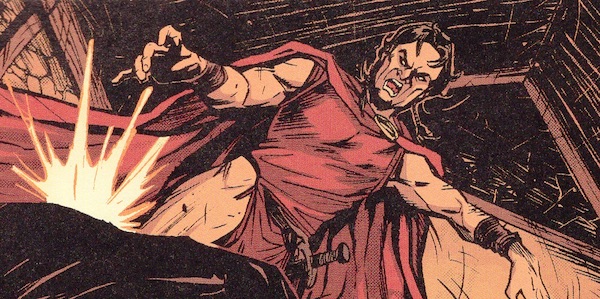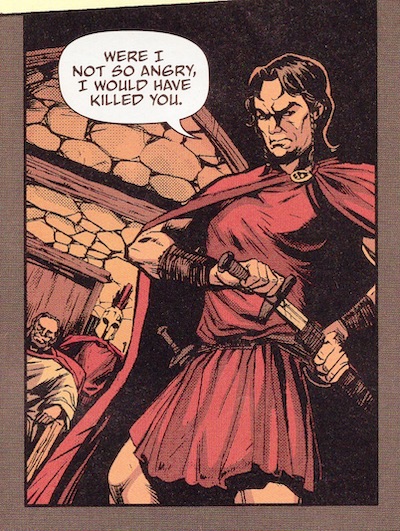
July 12, 2020, by Lynn Fotheringham
Angry Spartans
(Διαβάστε στα Ελληνικά.) (Revised 10/08/20.)
CONTENT: ANCIENT GREEK SLAVERY, ABUSE OF THE ENSLAVED, VIOLENCE, DEATH-THREATS
For an introduction to the graphic novel Three, see this previous post.
Once the Helots have been made drunk, one of our three protagonists, Terpander, starts shooting his mouth off – although to be fair, he’s quite capable of that when sober. Something he says makes the young Spartiate, Arimnestos, go ballistic: he kicks Terpander over and starts to draw his sword. But when his father shows disapproval of this action, Arimnestos restrains himself, saying:

THREE, ch./issue 1, p.19 panel 5
This saying is attributed to an early Spartan king, Charilaos/Charillus (8th century B.C.E.), in a collection called Sayings of the Spartans that survives as part of Plutarch’s Moralia:
Τῶν δὲ εἱλώτων τινὸς θρασύτερον αὐτῷ προσφερομένου, “εἰ μὴ ὠργιζόμην,” εἶπε, “κατέκτανον ἄν σε.” |
When one of the Helots conducted himself rather boldly toward him, he said, “If I were not angry, I would kill you.” (Charillus 3 = Moralia 232c) |
- Text and translation by Frank Cole Babbitt, Loeb Classical Library vol.245, 1931.
Even if Charillus believed that the Helot deserved death for offending the king, he had enough self-control not to execute him under circumstances where the killing could be attributed to his anger rather than to justice.
Plutarch was writing in the late first/early second century C.E.; scholars debate whether this and other collections of sayings were assembled or just used by him. Even if it is a little earlier, it was still probably put together centuries after Sparta’s heyday. Sometimes the same ‘saying’ is attributed to different Spartans, suggesting that the main point of the stories was not to record historical facts but to show just how Spartan the Spartans were.
The way Kieron comments on this has a bearing on the relationship between Three and a certain famous predecessor in historical comics about Sparta:

THREE, historical footnote
Both Kieron and Frank Miller in 300 attribute some of the Sayings of the Spartans to different speakers from the ones identified in the Plutarchan text. But then, so does the Plutarchan text! I don’t see this practice as an ‘error’ on the part of historical novelists; rather, it situates them in a very ancient tradition of re-use and adaptation. Clever redeployment of extracts from the sources in new narrative circumstances is one of the things I enjoy most when reading historical fiction!
In any case, Kieron isn’t necessarily implying that Arimnestos is the one who came up with the saying. Given his character as it is revealed to us over the course of the story, it’s just as likely that he’s quoting the long-dead king – or even a Spartan proverb, not necessarily associated with anyone in particular. At this period in the fourth century, when Sparta’s power in Greece had been broken, myth-making about what made a Spartan Spartan was probably rampant. We’ll see a wonderful example of Kieron playing with this idea, and with the inconsistencies in our sources, in chapter/issue 2.
Finally, this sentiment about not punishing someone while you’re angry has always felt familiar to me from somewhere else, but I’ve never been able to trace it. Is it expressed by some Victorian father or schoolmaster in Dickens or the like, trying to increase the culprit/victim’s guilt? Let me know if it rings any bells…
Bibliography:
Philip A. Stadter, ‘Plutarch’s compositional technique: the anecdote collections and the Parallel Lives’, in Greek, Roman & Byzantine Studies vol.54 (2014), pp.665-686.
- This writer does believe Plutarch created the collection, although as part of his note-making process rather than as a work to be published.
NOTE: I may refer to/quote comments on this post either in later blog-posts or in a research publication. More information about my audience-research, including a Privacy Notice and ways of getting hold of the book.
Extracts from Three © 2013 Kieron Gillen & Ryan Kelly. Used with permission.
No comments yet, fill out a comment to be the first

Leave a Reply